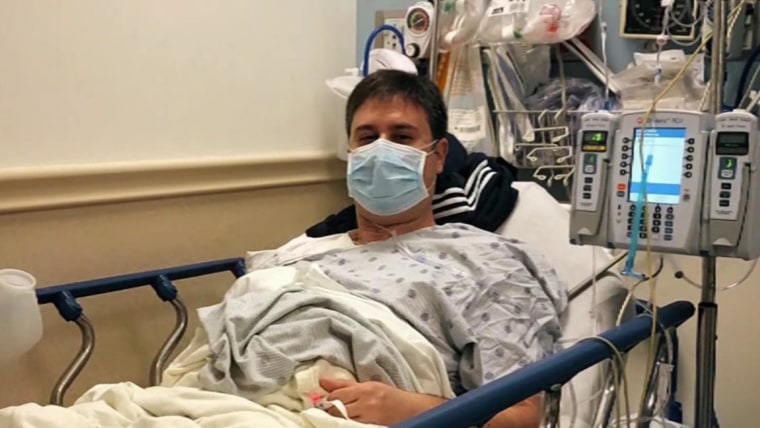They are survivors of severe cases of the coronavirus, most of them had been hospitalized, some of them hooked up to ventilators for several days and none of them ever wanting to experience the misery, uncertainty and loneliness of the illness ever again.
“It really makes you not take anything for granted anymore, even the small things,” Leah Blomberg, 35, of Muskego, Wisconsin, said Thursday during a Facebook Live hangout. “Every moment I get with my husband, I cherish it.”
Full coverage of the coronavirus outbreak
NBC News spoke with Blomberg and four others who tested positive for COVID-19, the disease caused by the coronavirus, to find out what it was like to have extreme cases and how they’ve recovered in recent weeks. While the number of infections and deaths continue to grow daily, most people do get better and some may have no symptoms at all.
But for those who have been hospitalized in intensive care units, the experience can be terrifying — if they even remember it.
Blomberg said she was put on a ventilator for a total of nine days, leaving her in a medically induced coma.
“It really is a humbling experience,” she said of her time in the hospital.



She added that she was grateful she didn’t know beforehand the grim statistics associated with being on a ventilator. One study in the Journal of the American Medical Association that looked at 5,700 coronavirus patients at 12 hospitals in New York City and Long Island found that about 21 percent of patients died, but for the 12 percent who were deemed extremely sick and in need of ventilators, the death rate was 88 percent.
Andrew Coffield, 29, of Aurora, Illinois, said he was on a ventilator for seven days during his 13-day hospitalization. He was told he was unconscious for about five days, and his 2-year-old son would FaceTime with him, saying, “Daddy, wake up. Daddy, wake up.”
Let our news meet your inbox. The news and stories that matters, delivered weekday mornings.
But as his situation deteriorated, with his vitals dropping and his fever spiking again, he had a sudden turnaround two days after coming off the ventilator, he said.
Download the NBC News app for full coverage and alerts about the coronavirus outbreak
“I truly believe that God healed me,” Coffield said, adding, “The doctors and the nurses couldn’t explain it. … They just kept coming in and said, ‘You’re a miracle.’”
Being in the hospital away from his family and then recovering at home without touching them were among the loneliest moments of his life, he added.
Another survivor, Jess Marchbank, 32, of North Devon, England, could relate.
She said she longed to touch her children, ages 2 and 4, even after she returned home from the hospital, but could not until she was completely virus-free.
“It’s the most loneliest experience I think I will ever go through,” she said. “You don’t get that contact, that touch, that love and nurture that we need to mentally get better, as well as physically.”
But once she was able to hold her family, she said, it was “so much better than Christmas morning.”
All of the survivors say they still feel sapped of energy and wiped out.
Although he wasn’t hospitalized, Dwight Everett, 65, of Ventura County, California, said he decided to donate plasma after fully recovering as a way to help others afflicted by the disease.
As a possible treatment for very sick coronavirus patients, some hospitals are testing the injection of a “convalescent serum” based on the blood plasma of people who have recovered.
Everett’s plasma is going to people like the wife of Luis Meza, of Santa Maria, California. Meza said his wife is in a Los Angeles hospital after contracting the coronavirus from him.
She remains on a ventilator after 26 days in the hospital, he added.
“I would do anything to save my wife,” Meza said of the plasma treatments. “I’ll sell anything I own to save my wife.”
He said she has been slowly getting better, but must learn to move her hands and her legs again after the virus ravaged her body.
The idea that some people still don’t take the coronavirus seriously or aren’t following social distancing guidelines and stay-at-home orders is upsetting for him and the other survivors.
Blomberg added that protesters have the right to demonstrate, but they’re putting others at risk.
“A lot of the reasons that people are protesting are so shallow. ‘I want a haircut. I want to get my nails done.’ Really?” Blomberg said. “I can understand the small-business owners are hurting. But I’m sure that when the medical community has cleared things and say we’re OK to go back to begin opening things up again, I’m sure our communities will rally around their small businesses and help bring them back.”

